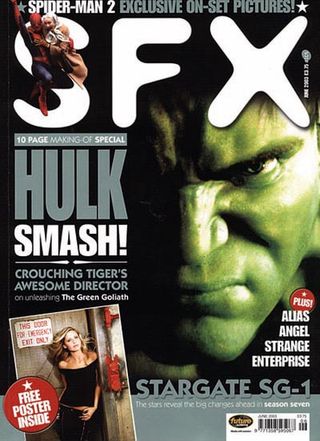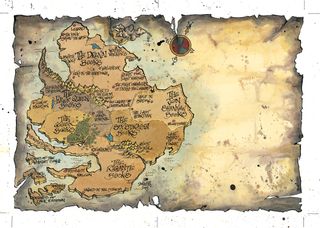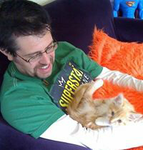SFX Issue 105
None

June 2003
Interview:
Gemmell on Gemmell
Literature’s premier ex-bouncer, David Gemmell, takes you through his work, series by series…
(Click on the image for a larger version)

The Drenai Tales
Drenai is, in fact, just one region in a vast fantasy continent to which Gemmell has been constantly adding over the last 19 years, comprising other such areas as Chiatze, Ventria, Dospilis and Tantria. Gemmell has written about this continent at various points through 500 years of its history (though he promises the next book will stretch that time-scale further). Main heroes include Druss The Legend (aka Deathwalker), Waylander, Skilgannon, and Tenaka Khan.
“The first Drenai book was written when I was being tested for cancer, so I didn’t actually have any idea of a world at all. What I knew was I couldn’t do a historical siege because I didn’t have time for research – I was going to try to write everything in two weeks. So I just invented this world. And I invented it very much with the kind of weaponry that would have been around in the middle-ages. So I didn’t have an idea for a world. I didn’t think, ‘Okay, right now I’m going to write 17 books about this world over the next 15 years.’ I just literally ripped out a 50,000 word short story, novella if you like, which I later reworked and increased. The reason for the other Drenai novels wasn’t because I had a particular statement to make about any period of history, it was literally that more and more fans were writing asking for more and more stories about this particular world. So the Drenai world just kind of evolved. It came from nothing and it just evolved.”
The Rigante
Century-spanning fantasy retooling of Celtic history (which actually has very few fantasy elements). Earlier books equate roughly with Roman times, whereas in later books it’s the metaphorical English who are the baddies. All in all a blisteringly good series, featuring arguably Gemmell’s greatest, and certainly most subtle creation – the Moidart.
Sign up to the SFX Newsletter
Get sneak previews, exclusive competitions and details of special events each month!
“I’ve always been fascinated by Scottish history and the way the Scots were treated by the English. The way the clan structure survived despite all of the things the English did to try to destroy it. There’s a huge courage and nobility within the Scots which meant that when we tried to destroy the clans – killing off the leaders, refusing them the right to wear clan colours, even outlawing names so that no-one could have the name McDonald – what we were doing was seeking to destroy everything about their culture. And could we do it? We could not. I wanted to write about the power within that people, and I wanted to find it in a fantasy format, because if I had written it historically it would have been so bleak, what they had to go through.”
The Sipstrassi
There are two distinct strands to the Sipstrassi books, Gemmell’s take on the Arthurian legend set in “Brittania”. The Stones Of Power books, Ghost King and Last Sword Of Power , are set in the chaotic days preceding an apocalypse and star Culain, The Legendary Lord Of The Lance, while the John Shannow books are post-apocalyptic and star the eponymous Mr Sharrow.
The Stones Of Power: “One of things that I’ve always been fascinated with is King Arthur. Most fantasy authors are. So I wanted to do my own take on the Arthurian legend. And the other thing I wanted to look at in that particular story was the whole thing about violence as an answer to a problem. I dealt with the question of: what’s the most powerful force in the universe. Is it hate? Is it love? I wanted to look at that more than I had in previous Drenai novels.”
John Shannow: “John Shannow was an odd one. There was one particular day in Bournemouth when I was working on newspapers, and I was in a hotel. And it was a hideous hotel. I had been working all day. It was about ten o’clock. I went in. I wanted to get some room service. ‘No, we don’t do room service.’ Er, well do you have any food at all? ‘Yeah, we have half a jar of olives.’
“So I took half a jar of olives and a bottle of Almanac to my room. And I get a phone call from my dad; he tells me my mother is back in hospital with cancer again. And this time it’s inoperable and she’s going to die.
“I then get another phone call from one of my bosses saying he’s going to come down and see me tomorrow. I know what it is. I’m going to be made redundant. And when I’m made redundant, I know that the staff that I had employed – who had given up good jobs to come and join me because they trusted me – are going to be sacked, too.
“So I’m thinking, ‘Right, I’m not going to go to sleep so I’ll carry on with the book I was writing.’ And the book I was writing was a Drenai novel. And I knew the scene I had to start it with – a scout riding to the top of a hill. So I typed, ‘The rider paused at the top of the hill but there was no sign of Jerusalem.’
“I leaned back and realised that obviously there would be no sign of Jerusalem because this is a fantasy world. Why did that line appear? I just stared at it and kept thinking, ‘Who is this person looking for Jerusalem and why can’t he find it?’ It can’t be set in any historical period that we know about because if he knew about Jerusalem he’d know where it was. And therefore it must be post-apocalyptic and the world was hideously changed. And so now Jerusalem has become almost mythic. That’s how he became the Jerusalem Man.
“The reason I made him a western character – though I didn’t know it at the time – was that when I had driven into Bournemouth that day I went through an underpass. And above it there was a huge poster for a movie with a big face on it – and it was Clint Eastwood in Pale Rider . So that must have been how it seeped in.”
The Hawk Queen books
Set in High Druin… well, actually two versions of High Druin since our hero, Sigarni, the Hawk Queen ends up in an alternate universe version of her homeland in the second book. The proud Highlanders have been conquered by the Outlanders, but spunky, sexually-voracious Sigarni, the last of a line of Highlander Kings, starts the fight back.
“I know that 90% of my readership is young males, and I know what they want is male heroes. I was thinking, ‘Wouldn’t it be fun to have a female hero, and to try and figure out how a woman would do the things you need them to do in a fantasy novel without them just being a surrogate man?’ Everything Sigarni does in Ironhand’s Daughter had to have strong feminine reasoning behind it. As one of my test readers at the time said, ‘If you write this novel and any part of it could just be switched around so that you change it from “she” to “he” and it works then it’s wrong.’ And it was a big struggle. I knew it wouldn’t go down well with the young male fans.
The Greeks Books
Tales of ambition in ancient Greece mixed with lots of magic and alternative realities.
“Many years ago, when I was a local journalist living in London, I was sent to the Acacia House Spiritualist Centre in Acton, West London. I was writing a feature about a clairvoyant who operated there. The clairvoyant told me incredible stuff about my own life that she couldn’t possibly have known and then told me that I was an ‘Old Soul’ and that I had lived in Ancient Rome. This, she said, was why I had such instinctive ‘knowledge’ about the period. I have always had a fascination for Greek and Roman history, so maybe she was right. There is still enough of the romantic in me to say that, given the choice, I would have lived in Sparta at the time of Leonidas.”
INDIVIDUAL TITLES
Morningstar
“I sat down one afternoon. I was watching the Biography Channel and they had Errol Flynn on it. And Errol Flynn, it turns out, was an utter rat. You know he had several rape cases that were paid off, and he betrayed almost every friend he ever had? He was a total rat. Very charming, but a total rat.
“And then I was flicking channels, and what do I get? The Adventures Of Robin Hood . And there is Errol Flynn – the pure Errol Flynn – that we all want to believe in, and I sat there and I thought, ‘Wouldn’t it be great to write The Adventures Of Robin Hood with the real Errol Flynn as Robin Hood?’
So what you got was Jarek Mace, the Morningstar, who is in fact a rat and a betrayer and thief and a liar, and he is being propelled into certain events which he still deals with selfishly and cavalierly but what he does is perceived by others as being broadly heroic and wonderful. So you get this legend that begins to grow up around him.
“What I wanted to look at was how that sort of thing would affect a man. Because often, as teachers will tell you about students, a student will either live up or live down to expectation. If a man is perceived as a hero, and people adore him, does he continue to be a rat, or at some point does he feel compelled almost by peer pressure to be a hero?”
Dark Moon
“I was talking to a psychiatric nurse who I know who was dealing with a clinic that had youngsters with multiple personality problems. She said that one of the difficulties is that there is nothing that can be used in any way as a positive role model for people with multiple personality problems.
I went away and thought, ‘Yeah, that’s what I’ll do. I’ll write a positive role model for a people with multiple personality problems.’
“Everything in Dark Moon is based on pure psychiatry. All of the dreams that Tarantio suffers are real, they have been taken from people with multiple personality problems. One of the classics that you always get is dreaming about being trapped in some kind of labyrinth and hearing a voice calling help, ‘Help, help!’ Well, the person calling help is the real you.
“When it came out she read it and she’s used it in the clinic. I’d like all my work to have some kind of positive effect on the people who read it.”
Echoes Of The Great Song
“It’s interesting looking back at this in the light of what’s been happening in Iraq. What you get in the book is a colossal power that sees itself as great and therefore can do whatever it likes. What it’s ultimately faced with is itself… but from a parallel universe. And then this power looks at this alternate version and says, ‘Well they’re evil, so what does that make us?’
Knights Of Dark Renown
“One of my real favourites. I wanted to look at what creates heroes and why some people choose to be heroes. So what we have is that in the past there were these wonderful characters called the Knight Of The Gabala, rather like King Arthur’s knights going around fighting evil. But they’ve vanished. They’re gone. Nobody knows where they’ve gone. The world has entered a period of real unpleasantness. Also, there are some evil knights that have appeared; truly vile.
“So, someone comes up with the idea that what we really need now is The Knights Of Gabala reborn. But, in fact, all we’ve got is a band of really deeply unpleasant and weak no-hopers, but we make them the new Knights Of The Gabala. They have to take on evil, and none of them are capable of winning.
“It’s why they stay and why they do the things they do that I explore.”

Dave is a TV and film journalist who specializes in the science fiction and fantasy genres. He's written books about film posters and post-apocalypses, alongside writing for SFX Magazine for many years.
Most Popular




